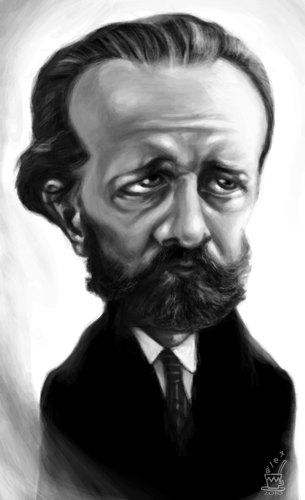TCHAIKOVSKY
#102075 / 10867 kez izlendiPyotr Ilyich Tchaikovsky[a 1] (Russian: Пётр Ильич Чайковский, tr. Pëtr Il'ich Chaikovskiy IPA: [ˈpʲɵtr ɪlʲˈjitɕ tɕajˈkofskʲɪj] ( listen)); often Peter Ilich Tchaikovsky /ˈpiːtər ˈɪlɨtʃ tʃaɪˈkɒvski/ in English; May 7, 1840 [O.S. April 25] – November 6, 1893 [O.S. October 25])[a 2] was a Russian composer of the Romantic era. His wide ranging output includes symphonies, operas, ballets, instrumental and chamber music and songs. He wrote some of the most popular concert and theatrical music in the classical repertoire, including the ballets Swan Lake, The Sleeping Beauty and The Nutcracker, the 1812 Overture, his First Piano Concerto, his last three numbered symphonies, and the opera Eugene Onegin.
Born into a middle-class family, Tchaikovsky was educated for a career as a civil servant, despite his obvious musical precocity. He pursued a musical career against the wishes of his family, entering the Saint Petersburg Conservatory in 1862 and graduating in 1865. This formal, Western-oriented training set him apart from the contemporary nationalistic movement embodied by the influential group of young Russian composers known as The Five, with whom Tchaikovsky's professional relationship was mixed.
Although he enjoyed many popular successes, Tchaikovsky was never emotionally secure, and his life was punctuated by personal crises and periods of depression. Contributory factors were his suppressed homosexuality and fear of exposure, his disastrous marriage, and the sudden collapse of the one enduring relationship of his adult life, his 13-year association with the wealthy widow Nadezhda von Meck. Amid private turmoil Tchaikovsky's public reputation grew; he was honored by the Tsar, awarded a lifetime pension and lauded in the concert halls of the world. His sudden death at the age of 53 is generally ascribed to cholera, but some attribute it to suicide.[1]
Although perennially popular with concert audiences across the world, Tchaikovsky's music was often dismissed by critics in the early and mid-20th century as being vulgar and lacking in elevated thought.[2] By the end of the 20th century, however, Tchaikovsky's status as a significant composer was generally regarded as secure.[3]




Yorumlar (16)
Yorum ekle Sayfa 1 2Member
frostyhut, tarih 02. January 2012 report post cevap ver applause 0
Member
sanjuan, tarih 20. January 2011 report post cevap ver applause 0
Member
Osama Salti, tarih 04. November 2010 report post cevap ver applause 0
Member
thatboycandraw, tarih 29. October 2010 report post cevap ver applause 0
Member
ivo, tarih 28. October 2010 report post cevap ver applause 0
Member
Xavi dibuixant, tarih 26. October 2010 report post cevap ver applause 0
Executive
BenHeine, tarih 26. October 2010 report post cevap ver applause 0
Member
Krinisty, tarih 26. October 2010 report post cevap ver applause 0
Member
Simply wonderful!
*****
I absolutely agree!!! :) ************
menekse cam, tarih 25. October 2010 report post cevap ver applause 0
Member
elle62, tarih 24. October 2010 report post cevap ver applause 0
Yorum ekle